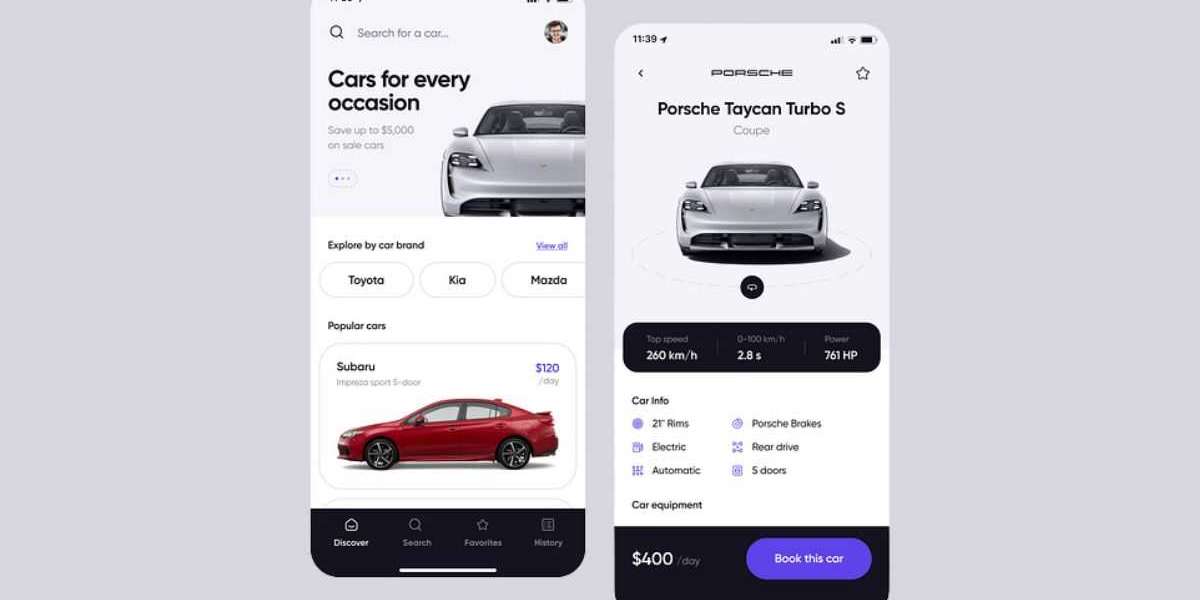Peer-to-peer car rental platforms have emerged as innovative disruptors in the transportation industry. By connecting individuals who want to rent vehicles directly with car owners looking to earn extra income, these sharing economy apps are revolutionizing the traditional car rental model.
Turo is one of the leading peer-to-peer car rental marketplaces that has seen tremendous growth since its founding in 2009. The platform allows anyone with an eligible personal vehicle to list it for rent and handles all the logistics of booking, payments, insurance, and customer support through its mobile app and website. On the other side, those in need of a rental car have access to a much wider selection of unique vehicles at competitive hourly and daily rates.
With over 5 million registered users and over 200,000 active listings in more than 5,500 cities across the US, Canada, and the UK, it's clear that Turo has succeeded in transforming the car rental experience. In this article, we will explore 11 key reasons why a peer-to-peer rental platform like Turo represents such a game-changing approach that benefits both vehicle owners and renters.
1. Convenience of Availability
The first major advantage of car rental apps is convenience. Unlike traditional agencies that are primarily located at airports, Turo cars can be found all over a city and its surrounding areas - often right in the neighborhood where a renter needs one. This localized access removes the hassle of having to arrange transportation to and from an off-site rental location.
Users simply open the Turo app, search their area, and can instantly view all the vehicle options available right near them with pick-up and drop-off addresses indicated. They can then book, unlock, and pay for their rental entirely through the app or website for the ultimate in hassle-free convenience. No longer do renters need to schedule rentals days in advance or stick to rigid rental periods. Thanks to the on-demand access Turo provides, rentals can be booked as needed with much better flexibility.
2. Wider Selection of Vehicle Types
In addition to far greater availability, Turo gives renters access to a much wider selection of vehicle types compared to traditional agencies. While the major rental brands primarily offer economy sedans and standard SUVs, Turo hosts a more diverse fleet.
Renters can find classic and luxury cars like Mercedes, BMWs, Porsches as well as unique options like vintage Volkswagens and Jeeps. The platform also offers smaller local rentals of cargo and passenger vans, pickup trucks, and specialty vehicles suitable for hauling equipment or large groups. This variety of choices means you aren't limited to just one size fits all. You can pick the perfect vehicle for your needs, budget, and interests.
Turo renters have even taken exotic supercars like Lamborghinis, McLarens, and Ferraris for a drive. Try finding those options at an airport rental counter! The abundant selection reflects people's diverse transportation demands and tastes more holistically.
3. Competitive Pricing
Free from the overhead of maintaining large rental fleets across many locations, peer-to-peer platforms pass notable savings directly to customers. Turo vehicle owners set their own flexible daily and hourly rental pricing to be cost competitive for renters while also maximizing their earnings.
Studies have found Turo rentals average between 10-30% cheaper than traditional agencies for comparable vehicles. Owners don't have to recoup the high expenses of large rental operations so they can offer better rates. Additionally, taxes and unwarranted fees are removed which frequently jack up traditional rentals.
Flexible pricing also means finding deals, as owners sometimes offer promo rates to keep their cars booked. Renters can save even more by renting cars during off-peak times when supply is higher. Overall, the stripped-down overhead structure enables very competitive car rental pricing on sharing economy platforms. Visit: https://zipprr.com/turo-clone/
4. Local Community Focus
Community is central to the peer-to-peer model. Unlike large agencies, the localized nature of Turo means renters interact directly with and support real people in their own neighborhoods. They get to experience unique local vehicles while building community connections.
Local economy experts note this hyperlocal approach keeps money circulating within communities rather than being syphoned off to big corporations. Turo owners earn supplemental income to plow back into the local area rather than lining corporate coffers. It integrates sharing seamlessly into local commerce which some studies show increases entrepreneurship and local spending.
For renters, knowing they're supporting neighbors through their choice makes the experience more personable. Some may even strike up new friendships from a chance meeting during pickup or dropoff. This community-centric sharing model creates a "feel good" factor absent from faceless major agencies.
5. Earn Extra Income Through Rentals
Generating extra income is one of the top reasons people choose to list their vehicles on Turo. By occasionally renting out an otherwise idle personal asset, owners earn rental revenue to supplement household finances. This allows them to earn returns on large vehicle investments which typically depreciate over time.
Some owners are able to cover much or all of their monthly payments, insurance costs, and maintenance expenses through strategic rental activity. Turo takes 25-30% of each booking as a service fee, but owners still clear significant profit, especially with high-demand luxury or specialty cars. It's a viable side business for those with expensive vehicles they can't otherwise recoup costs on.
The flexibility also appeals as owners choose when and how much to make their cars available. Need cash for a vacation? Rent it out for those dates. Going out of town and the car would sit unused otherwise? List it to earn while away. Unlike traditional gig work, owners control their hours and logistics completely independently through the Turo platform and mobile access.
6. Opportunity for Car Discovery
Renting cars is frequently more about discovery than necessity. Turo opens doors for people to experience vehicles they otherwise may not have considered driving long-term. It gives users a chance to "test drive" new models, brands, or alternative fuel/technology options ahead of any purchase commitment.
Families can try out various SUVs and vans to determine the right family-hauler before buying. Young professionals may sample luxury marques to see if they align with an impending status upgrade. Those curious about electric vehicles gain hands-on experience with EVs and hybrids at an affordable rental rate rather than a big purchase leap.
The ability to easily access different vehicles aids significantly in purchase decisions. Renters often return to Turo to continue exploring options as their needs and budgets change over time. It exposes people organically to a variety of responsible transportation choices within their local communities.
7. Reviews and Ratings Build Trust
Transparency and accountability are crucial for any sharing platform to thrive. Turo excels through robust public reviews and ratings that foster trust between parties. After each trip, renters and owners can leave detailed feedback about their experience that is visible to potential future transactors.
This allows users to make informed choices based on real experiences. Owners are also rated for communication, vehicle condition, and checkout/dropoff quality. High scores signify conscientious community members worth doing repeat business with. Meanwhile, low-rated parties risk losing potential bookings or access to the Turo platform over time.
Overall, the review system drives better quality assurance through social accountability. This grassroots incentive, not corporate policy, structures a highly reliable, safe rental experience for all. Positive personalized reviews and high star ratings have become a hallmark feature attracting more users each year.
8. Instant Booking and Payment
Seamless transaction logistics are crucial to any sharing service. Turo excels through a streamlined mobile experience allowing instant booking confirmation and payment execution. Users simply find a vehicle that fits their dates and budget, request it, and get an immediate response whether it is still available.
Payment is collected upfront through secure reservation deposits, preventing no-shows or flakes. Online vehicle access instructions provide pickup/dropoff ease. While owners can opt for contact meetups as well, the app gives the choice of a truly contactless self-service rental. This efficient process saves time versus traditional counters while reducing social contact points during COVID-19 era concerns.
Integrated calendar booking and payment functionality cuts out endless paperwork, queues, and human interactions. The intuitive mobile platform shrinks what used to be an hours-long rental experience down to just a few quick taps. The result? Frictionless car rental ease through always-available high-tech conveniences.
9. International Rentals Easy
Turo seamlessly accommodates booming demand for international and cross-border rentals as well. In addition to listing vehicles for rent domestically, many Turo owners have expanded their fleets globally to serve international visitors. Popular destinations like Los Angeles, San Francisco, New York and Florida host rentals from all over the US, Canada, Mexico, Europe and beyond.
For renters, finding vehicles worldwide is now simple regardless of their travel destination or origin point. No dealing with language barriers, airport nav issues, or money exchange complications traditional agencies burden customers with. International travelers can rent point-to-point at their convenience versus strict agency schedules.
Notable benefits of international Turo rentals include avoiding inbound/outbound airport logistics and local transport inconveniences. Renters gain familiarity renting in languages and currencies they understand while owners tap into new global visitor markets.
Turo facilitates hassle-free border crossing documentation for cross-border use as well. The ability to access affordable rental vehicles seamlessly anywhere worldwide expands people's international travel options tremendously. Traditional agencies could not accommodate global mobility at this personalized local level.
10. Complement Existing Mobility Options
Peer-to-peer platforms provide an important missing piece in multi-modal transportation ecosystems. They complement—rather than compete with—existing public transit, ride-hailing services and micro-mobility options.
Turo serves as an accessible bridge filling transportation gaps. Need a car for an out-of-town day trip not well-served by trains or buses? Rent one on demand through the app. Have a weekend itinerary involving activities spread out over a large metro area? Rent rather than rely on multiple Uber rides.
It builds upon but does not replace public options. Those taking rideshares or renting bikes/scooters for 99% of local trips can still use Turo for occasional larger hauls or one-way rentals extending their mobility radius. This symbiosis optimizes local transportation networks versus promoting excessive vehicle ownership.
11. Expanding Automobility Responsibly
Sharing platforms promote expanded access to private vehicles in a responsible, community-oriented way. They uphold principles of environmental sustainability and social equity better than traditional rental models could.
By maximizing vehicle utilization, Turo reduces under-deployment of resources that sitting idle actually waste. It incentivizes efficient multi-passenger rides and provides low-cost options for those in transit deserts.
At the same time, peer-to-peer networks steer users organically towards lower-emission vehicles as preferences evolve. Renters gain exposure trying hybrids, EVs and varied fuel-saving models they may adopt long term. As their fleets electrify, Turo owners enable convenient testing of new green technologies.
This balanced, user-driven approach to automobility expansion upholds values of community, sustainability and transportation justice better than any regulated system could alone. Sharing improves lives through responsible access and local empowerment on a large scale.
Conclusion
In conclusion, peer-to-peer car rental platforms have proven themselves powerful innovators enhancing mobility while upholding high community and environmental standards. By connecting individuals directly as buyers and sellers of transportation services, they have transformed a rigid industry into a nimble, user-focused model.
Through localized on-demand access, diverse vehicle fleets, competitive pricing, built-in community benefits and seamless transactions, Turo represents a sharing economy approach that benefits all stakeholders. As the platform continues growing globally, it will keep redefining expectations around vehicle access and the roles cars play in sustainable communities.
Ultimately, Turo is a catalyst driving positive industry disruption that expands responsible transportation options through technology. By putting people and planet first, it demonstrates how collaborative networks can transform outdated systems for common good on a large scale. The flexible peer-to-peer rental model sets an example all industries would be wise to emulate.



